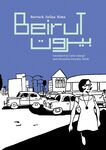
retail price - $19.95
copacetic price $16.95
Red Eye, Black Eye
published by Alternative Comics
Occupying the opposite end of the empathy scale, K. Thor Jensen has created a bit of a hybrid with his graphic travel memoir, Red Eye, Black Eye. With it, he takes a page out of the playbook of Aaron Cometbus -- who seems a clear inspiration here -- and splices it together with the comics language of James Kochalka and Jeffrey Brown, and the chops of a host of others to tell his tale of dropping out of his day to day life and turning on to two months bumming around the USA on Greyhound buses in his attempt to tune in to what it's all about, hoping that this will enable him to find how to start the next chapter of his life. While it is clear that he was successful in dropping out and turning on, the scenarios Jensen has chosen to delineate provide little if any evidence that he managed to tune in. The reader of this tale is likely to find it a frustrating experience for, as he portrays himself, Jensen seems totally unable to really connect with anyone, and remains trapped in a singularly unattractive personality throughout the entire epic journey, returning home, 300 pages later, apparently no wiser. Red Eye, Black Eye can be an instructive, if somewhat awkward -- at times painfully so -- experience, as Jensen repeatedly reveals his woeful lack of the social graces. The dictum "character is destiny" receives a solid endorsement here as Red Eye, Black Eye provides a veritable catalogue of personal-growth inhibiting character traits; and it is crystal clear that lack of empathy is chief among them. This approach may or may not -- it is not clear -- have been an intentional decision, a self-lacerating attempt at self-correction, but this lack of clarity impedes an appreciation of the work. Jensen is not without storytelling abilities, however, as he effectively puts his tale across. He is strongest when he relates the individual stories that he is told by his numerous hosts during his various stays. Woven within the overall fabric of the tale of his journey, these short -- most are one or two pages -- stories are the best part of this book. One cannot help coming away from reading this hoping that Jensen has learned something from all this, that he has moved towards a better understanding of and closer feelings for his fellow beings and so will be better able to connect with those around him. The fact that he has acted on a desire to communicate his experience and has completed the arduous task of crafting this lengthy work means that, in all likelihood, he has.
Search Copacetic
Just in:










